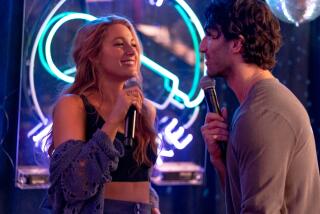Review: In ‘The Place Beyond the Pines,’ society is the bad guy
Violence is the trigger in “The Place Beyond the Pines,” Derek Cianfrance’s latest love letter to bad breaks. But it’s the ripple effect of responsibility, regret, limited resources and guilt that makes “Pines” particularly relevant in a time when so many struggle from paycheck to paycheck.
Starring Ryan Gosling, Eva Mendes, Bradley Cooper, Ray Liotta and Dane DeHaan, the movie is intimate in its telling, sweeping in its issues and stumbles only occasionally.
The idiosyncratic Cianfrance tends to gravitate toward the economically challenged who live lives of desperation. It’s a cultural slice that seems as forgotten by cinema as by society, those carrying a deep longing for the American dream of home and family, and a deep resentment that it is out of reach.
Ambition — either too much or too little of it — shadows the writer-director’s work too.
Those themes certainly drive “The Place Beyond the Pines” down some extremely rough roads and make it a logical follow-up to Cianfrance’s critically acclaimed “Blue Valentine.” The 2010 film about the implosion of a marriage undone by a class divide and money woes earned Michelle Williams an Oscar nomination for her young mother with med-school dreams and featured Gosling in a standout performance as the high-school dropout she’s grown beyond.
This time, it is fathers and sons and their tortured bonds that are examined.
Instead of the serenity and contentment suggested by the title, Cianfrance has created a troubling trilogy on the legacy of one brutal encounter that cuts a destructive path through multiple lives.
The first of “Pines’” three stories is Luke’s (Gosling). Cianfrance carefully stacks the deck against the motorcycle stunt rider, and ultimately everyone else in turn. Hair bleached nearly white, Luke is a sinewy, tattooed daredevil whose cage-riding thrills are the main attraction in a traveling carnival.
Romina (Mendes), a lean beauty with bruised eyes and a perpetual pout, shows up one night and life shifts. It takes a while to find that their hook-up the last time he was in town produced a son.
Trouble comes when Luke decides he wants to become a good father to tiny Jason. But that will require insinuating himself into Romina’s already settled life, which includes better husband prospects in Kofi (Mahershala Ali).
Luke needs help, and Robin, portrayed by the excellently scruffed-up Ben Mendelsohn, becomes his bailout. Robin, whose cigarettes hang so precariously they seem to defy gravity, is a fan of Luke’s — admiring the risk-taker he wishes he was.
Robin is also a mechanic running an off-the-books shop out of a garage as rundown as he is. But it gives Luke a job and a place to crash — until his new pal floats a get-rich-quick scheme that involves robbing banks.
It doesn’t take long for Luke to cross paths with the law, in this case a street cop named Avery (Cooper). Their face-off goes badly, and the film shifts to Avery’s story, the hometown hero who saved the day. That day will trouble Avery for a lifetime. His own fortunes turn on it.
PHOTOS: Hollywood backlot moments
Avery’s got his own temptations dangled by Deluca (Liotta), a dirty detective, and others by his father (Harris Yulin), a judge who offers help in the way of dissatisfied fathers seeing only their sons’ failings.
On one level, Avery’s and Luke’s lives aren’t so different — both have young sons whose mothers they love, both have a string of people they’ve disappointed. It is opportunity, wealth and education — external factors — that divide them, an irony to which the film keeps circling back.
The third chapter picks up 15 years later. Avery’s son AJ (Emory Cohen) has grown into a privileged kid primed to go bad. Luke’s boy, Jason (DeHaan), is living with a now worn-down mom and stepdad Kofi on the economic margins. When it comes to Jason’s future, unlike AJ, there are no great expectations. But like their fathers before them, their paths will cross in complicated and life-altering ways.
Cianfrance has a knack for picking the right moments to opt for understatement when the situation gets extreme. Mendes, DeHaan and Gosling in particular are good at not overplaying their hands. The easy smile, the wary eyes, the sense of danger with which Gosling infuses Luke makes him a more interesting lowlife that he would otherwise be. Cooper, coming off an Oscar nod for his unbalanced guy in “Silver Linings Playbook,” pushes Avery’s angst a little too hard, but it’s not enough to ruin the meditative mood.
The grit is reflected in the details — a yard enveloped in weeds, mutts underfoot, rusted hinges, metal security doors versus designer suits, manicured lawns, pristine pools — all the small ways circumstance overtakes lives. Sean Bobbitt, who collaborated with director Steve McQueen on another dark story, 2011’s “Shame” and the coming “Twelve Years a Slave,” served as director of photography.
With the rough edges of its sprawling tale sometimes exposed, “The Place Beyond the Pines” never quite reaches the refinement of “Blue Valentine.” But it does give us the sort of down-market lives we too rarely see and a kind of heartbreak that is rarer still — moving, evocative and even a little hopeful.
---------------------------------
‘The Place Beyond the Pines’
MPAA rating: R for language throughout, some violence, teen drug and alcohol use, and a sexual reference
Running time: 2 hours, 20 minutes
Playing: At the ArcLight, Hollywood; Landmark Theatre, West Los Angeles
PHOTOS AND MORE
TIMELINE: Violence in movies
ENVELOPE: The latest awards buzz
PHOTOS: Greatest box office flops
More to Read
Only good movies
Get the Indie Focus newsletter, Mark Olsen's weekly guide to the world of cinema.
You may occasionally receive promotional content from the Los Angeles Times.











